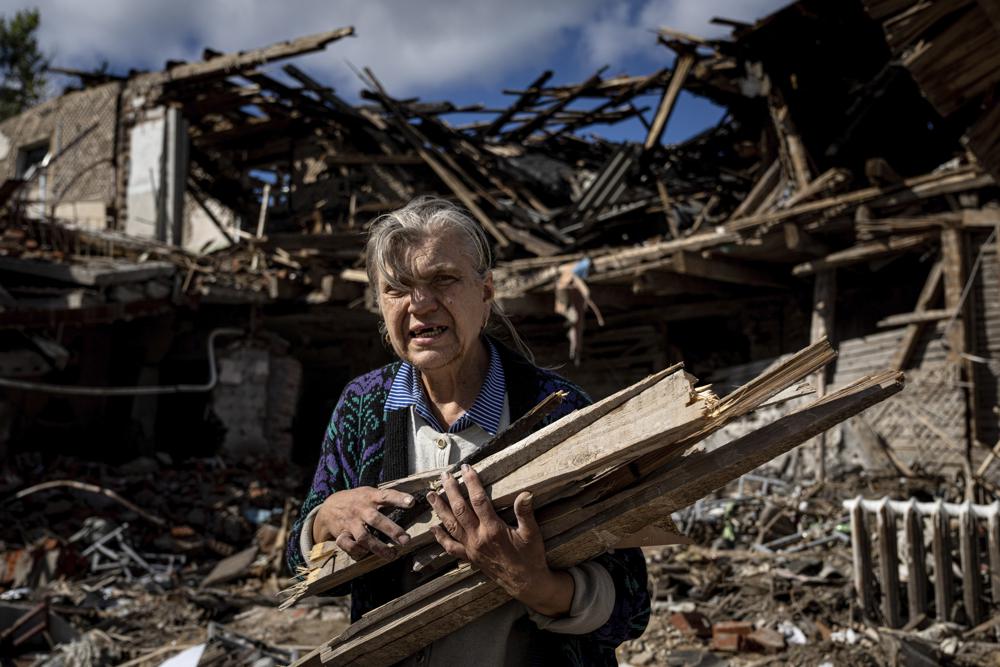Signs Of War Crimes In Ukraine, Says Team Of UN Rights Experts
Sep 23, 2022 | Pratirodh Bureau
A woman collects wood for heating from a destroyed school where Russian forces were based (AP Photo)
A team of experts commissioned by the UN’s top human rights body to look into rights violations in Ukraine said on Friday its initial investigation turned up evidence of war crimes in the country following Russia’s invasion nearly seven months ago.
The experts from the Commission of Inquiry on Ukraine, mandated by the Human Rights Council earlier this year, have so far focused on four regions — Kyiv, Chernihiv, Kharkiv and Sumy. Presenting their most extensive findings so far, they cited testimonies by former detainees of beatings, electric shocks and forced nudity in Russian detention facilities, and expressed grave concerns about executions in the four regions.
“We were struck by the large number of executions in the areas that we visited. The commission is currently investigating such deaths in 16 towns and settlements,” Erik Mose, the commission’s chairman, said.
He said his team had received and was documenting credible allegations regarding many more cases of executions. The investigators visited 27 towns and settlements, as well as graves and detention and torture centres; interviewed more than 150 victims and witnesses; and met with advocacy groups and government officials, he said.
Based on the evidence gathered by the commission, it has concluded that war crimes have been committed in Ukraine, Mose said, without specifying which side in the war committed the alleged crimes. He said the team had examined two incidents of ill-treatment against Russian soldiers by Ukrainian forces.
Mose said an unspecified number of Russian soldiers were found to have committed crimes of sexual or gender-based violence with victims ranging in age from 4 to 82 years old. The commission plans to gradually expand its investigation, with areas of interest including allegations of filtration camps for people being detained or deported, the forced transfer of people, and allegations of expedited adoption of children.
Meanwhile, India on Thursday told the UN Security Council that the need of the hour is to end the conflict in Ukraine and return to dialogue and added the nuclear issue is of particular anxiety.
“The trajectory of the Ukraine conflict is a matter of profound concern for the entire international community. The future outlook appears even more disturbing. The nuclear issue is (of) particular anxiety,” External Affairs Minister S Jaishankar told the 15-nation UN Security Council briefing.
The briefing, chaired by French Minister for Europe and Foreign Affairs Catherine Colonna, was held on Thursday as world leaders gathered in the UN headquarters for the high-level 77th session of the UN General Assembly.
Addressing the Council briefing were UN Secretary-General Antonio Guterres, US Secretary of State Antony Blinken, Chinese Foreign Minister Wang Yi, Russian Foreign Minister Sergey Lavrov and UK Secretary of State for Foreign, Commonwealth and Development Affairs James Cleverly and Foreign Ministers of other UNSC members.
Jaishankar told the Council that in a globalised world, the impact of the conflict is being felt even in distant regions. “We have all experienced its consequences in terms of surging costs and actual shortages of food grains, fertilizers and fuel. On this core too, there are good grounds to be worried about what awaits us,” he said.
He said the Global South, especially, is feeling the pain very acutely. “We must therefore not initiate measures that further complicate the struggling global economy. That is why India strongly reiterates the need for an immediate cessation of all hostilities and a return to dialogue and diplomacy,” Jaishankar said.
Referring to PM Modi’s remark to Putin on the sidelines of the 22nd meeting of the Shanghai Cooperation Organisation in Uzbekistan’s Samarkand, Jaishankar said, “Clearly, as Prime Minister Narendra Modi has emphasized, this cannot be an era of war.”
“On our part, we are also providing both humanitarian assistance to Ukraine and economic support to some of our neighbours under economic stress,” he said. Jaishankar emphasised that the need of the hour is to end this conflict in Ukraine and return to the negotiating table.
“This Council is the most powerful contemporary symbol of diplomacy. It must continue to live up to its purpose,” Jaishankar said. “The global order that we all subscribe to is based on international law, UN Charter and respect for the territorial integrity and sovereignty of all states. These principles too must be upheld, without exception.”
